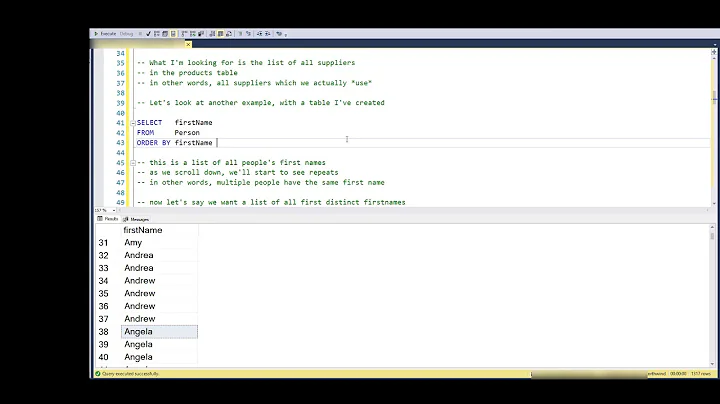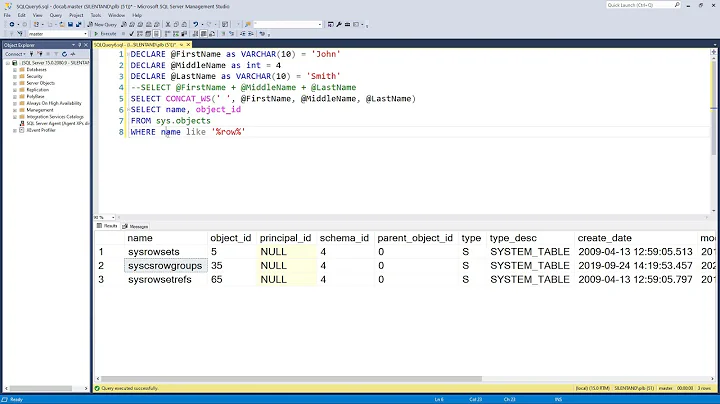sqlite3 JOIN, GROUP_CONCAT using distinct with custom separator
Solution 1
Look up the speaker/term names independently from each other:
SELECT _id,
name,
(SELECT GROUP_CONCAT(name, ';')
FROM events_speakers
JOIN speakers
ON events_speakers.speaker_id = speakers._id
WHERE events_speakers.event_id = events._id
) AS speaker_names,
(SELECT GROUP_CONCAT(name, ';')
FROM events_terms
JOIN terms
ON events_terms.term_id = terms._id
WHERE events_terms.event_id = events._id
) AS term_names
FROM events
Solution 2
I ran accross this problem as well, but came up with a method that I found a bit easier to comprehend. Since SQLite reports SQLite3::SQLException: DISTINCT aggregates must have exactly one argument, the problem seems not so much related to the GROUP_CONCAT method, but with using DISTINCT within GROUP_CONCAT...
When you encapsulate the DISTINCT 'subquery' within a REPLACE method that actually does nothing you can have the relative simplicity of nawfal's suggestion without the drawback of only being able to concat comma-less strings properly.
SELECT events._id, events.name,
(group_concat(replace(distinct speakers.name),'',''), ' - ') AS speaker_names,
(group_concat(replace(distinct speakers.name),'',''), ' - ') AS term_names
FROM events
LEFT JOIN
(SELECT et.event_id, ts.name
FROM terms ts
JOIN events_terms et ON ts._id = et.term_id
) terms ON events._id = terms.event_id
LEFT JOIN
(SELECT sp._id, es.event_id, sp.name
FROM speakers sp
JOIN events_speakers es ON sp._id = es.speaker_id
) speakers ON events._id = speakers.event_id
GROUP BY events._id;
But actually I would consider this a SQLite bug / inconsistency, or am I missing something?
Solution 3
That's strange that SQLite doesnt support that!.
At the risk of being down voted, only if it helps:
You can avail Replace(X, Y, Z). But you have to be sure you wont have valid , values in your columns..
SELECT events._id, events.name,
REPLACE(group_concat(distinct speakers.name), ',', ' - ') AS speaker_names,
REPLACE(group_concat(distinct terms.name), ',', ' - ') AS term_names
FROM events
LEFT JOIN
(SELECT et.event_id, ts.name
FROM terms ts
JOIN events_terms et ON ts._id = et.term_id
) terms ON events._id = terms.event_id
LEFT JOIN
(SELECT sp._id, es.event_id, sp.name
FROM speakers sp
JOIN events_speakers es ON sp._id = es.speaker_id
) speakers ON events._id = speakers.event_id
GROUP BY events._id;
Solution 4
The problem arises only with the group_concat(X,Y) expression, not with the group_concat(X) expression.
group_concat(distinct X) works well.
So, if the ',' is good for you, there is no problem, but if you want a ';' instead of ',' (and you are sure no ',' is in your original text) you can do:
replace(group_concat(distinct X), ',', ';')
Solution 5
Just to put a proper workaround (murb's answer is strangely parenthesized).
problem:
group_concat(distinct column_name, 'custom_separator') takes custom_separator as a part of distinct.
solution:
We need some no-op to let SQLite know that distinct finished (to wrap distinct and it's arguments).
No-op can be replace with empty string as a second parameter (documentation to replace).
group_concat(replace(distinct column_name, '', ''), 'custom_separator')
edit:
just found that it does not work :-( - can be called but distinct is not working anymore
Related videos on Youtube
aiwilliams
Updated on September 16, 2022Comments
-
aiwilliams over 1 year
Given a table of "events" where each event may be associated with zero or more "speakers" and zero or more "terms", those records associated with the events through join tables, I need to produce a table of all events with a column in each row which represents the list of "speaker_names" and "term_names" associated with each event.
However, when I run my query, I have duplication in the speaker_names and term_names values, since the join tables produce a row per association for each of the speakers and terms of the events:
1|Soccer|Bobby|Ball 2|Baseball|Bobby - Bobby - Bobby|Ball - Bat - Helmets 3|Football|Bobby - Jane - Bobby - Jane|Ball - Ball - Helmets - HelmetsThe group_concat aggregate function has the ability to use 'distinct', which removes the duplication, though sadly it does not support that alongside the custom separator, which I really need. I am left with these results:
1|Soccer|Bobby|Ball 2|Baseball|Bobby|Ball,Bat,Helmets 3|Football|Bobby,Jane|Ball,HelmetsMy question is this: Is there a way I can form the query or change the data structures in order to get my desired results?
Keep in mind this is a sqlite3 query I need, and I cannot add custom C aggregate functions, as this is for an Android deployment.
I have created a gist which makes it easy for you to test a possible solution: https://gist.github.com/4072840
-
aiwilliams over 11 yearsExcellent, thank you very much. I've received the added benefit of learning more about SQL.
-
aiwilliams over 11 yearsThis was the solution I used myself, so I won't down vote. The answer that avoids the possible failure of replacing a legitimate comma is, of course, the accepted answer :) Thank you for your time.
-
aiwilliams almost 10 yearsThank you for taking the time to write this up! It's been a long while for me since working on this problem, but after a few minutes review, I would have to agree that it seems like an inconsistency; I would expect the group_concat to support the custom separator with distinct. I don't find either solution hard to comprehend (once revealed!), and would prefer the one the does not require the invocation of a function that does nothing.
-
Matt Chambers almost 7 yearsThis doesn't work. As Mi-La's edit in their answer also admits. The distinct keyword no longer has the intended effect.
-
 Joan Cardona about 5 yearsreplace(x,y,z) did it for me. Ta.
Joan Cardona about 5 yearsreplace(x,y,z) did it for me. Ta. -
gpkamp over 4 yearsThe distinct keyword does have its intended effect for me (sqlite within an ios app) so this solutions worked well for me, thanks!
-
Albert about 3 yearsThat did it for me as well, but it did have duplication... sigh









